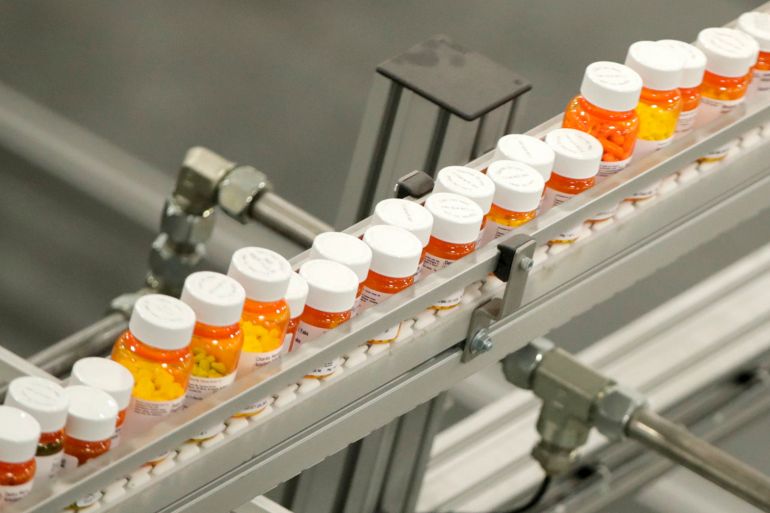Trump’s latest 100 percent tariff on pharmaceuticals: What we know
The US largely imports pharmaceutical products from India and European countries including Ireland, Switzerland and Germany.

By Sarah Shamim and News Agencies
Published On 26 Sep 202526 Sep 2025
Save
US President Donald Trump said on Thursday that he will impose a 100 percent import tax on pharmaceutical drugs. He also announced new tariffs on other products.
Here’s what we know, and what it all means.
What pharma tariffs has Trump announced?
In a post on his Truth Social platform on Thursday, Trump wrote that starting on October 1, the United States will impose a 100 percent tariff on any branded or patented pharmaceutical product.
The 100 percent tariff means prices of imported pharmaceutical products will double for American importers and consumers.
However, Trump said an exception would be made for any company which “IS BUILDING their Pharmaceutical Manufacturing Plant in America”.
He explained that “is building” refers to “‘breaking ground’ and/or ‘under construction’.”
Trump did not specify whether the new tariffs he is announcing will be applied on top of the national tariffs he has previously imposed on various US trading partners.
Where does the US import pharmaceutical products from?
Pharmaceutical products, including packaged medicaments; vaccines, toxins and cultures; and hormones, made up for about 5.6 percent of total US imports in 2023, worth around $158bn, according to the Observatory of Economic Complexity (OEC).
During that year, the US imported $86.4bn worth of packaged medicaments. About 14.2 percent, or $12.3bn worth, of packaged medicaments came from Ireland; 14 percent, or $12.1bn worth, came from Switzerland; 13.4 percent ($11.6bn) from Germany; and 10.6 percent, or $9.2bn worth, came from India.
Advertisement
Other countries from which the US imported these products include Italy, Denmark and the United Kingdom.
In 2023, the US imported $65.1bn worth of vaccines, blood, antisera, toxins and cultures. Out of this, 23.2 percent, or $15.1bn worth, came from Ireland and 20.9 percent, or $13.6bn worth, from Germany.

How have markets reacted to new pharma tariffs?
Pharmaceutical companies across Asia and Europe saw a drop in their share prices following Trump’s announcement.
Swiss companies Lonza, Novartis and Roche were down about 1.2 percent in early trading on Friday.
Shares in German drugmakers Merck and Bayer also fell – by 1.1 percent and 1.5 percent, respectively.
Japan’s Sumitomo Pharma closed 3.5 percent lower, while Otsuka Holdings fell 2.9 percent and Daiichi Sankyo dropped 2 percent. Not all pharma groups took a hit, however. Takeda Pharmaceutical edged down just 0.1 percent, while Shionogi, instead of falling, rose 1 percent.
Meanwhile, in India, the main pharmaceuticals index slid by 2 percent as all 20 listed drugmakers fell in price. Industry giant Sun Pharmaceutical Industries sank 3 percent, despite Indian drugmakers mainly producing generics, which are not targeted by new tariffs.
Australia’s largest biotechnology company, CSL, plunged to a six-year low, closing 1.9 percent below the previous day.
How will pharma industries be affected?
Despite the initial shock reflected in share prices, experts said Indian companies should not suffer overly from the tariffs, as some that supply products to the US are already based there and will therefore be exempt.
Namit Joshi, chairman of the Pharmaceutical Export Promotion Council of India, told CNN that the tariffs are “unlikely to have an immediate impact on Indian exports”.
“The bulk of our contribution lies in simple generics and most large Indian companies already operate US manufacturing or repackaging units and are exploring further acquisitions,” Joshi said.
While Indian pharmaceutical companies should not, therefore, be overly affected, the new tariffs merely add to the weight of 50 percent tariffs imposed on other Indian sectors by Trump earlier in the year. These were, in part, due to India’s continued purchase of Russian oil, Trump said.
Other foreign pharmaceutical companies will also get around tariffs by locating their operations in the US, some experts said. “The actual comment from the president is direct but its impact may be somewhere between nebulous and negligible,” Jared Holz, healthcare equity specialist at Japanese financial services group, Mizuho Securities, told Bloomberg.
Advertisement
“All major players have some production presence domestically and almost all have announced increased investment directly tied towards local manufacturing,” Holz said.
What effect could these tariffs have on the US pharma sector?
The pharmaceutical industry group, Pharmaceutical Research and Manufacturers of America (PhRMA), warned that tariffs could affect investment in US pharmaceuticals.
“PhRMA companies continue to announce hundreds of billions in new US investments thanks to President Trump’s pro-growth tax and regulatory policies,” Alex Schriver, senior vice president at PhRMA, said in a statement. “Tariffs risk those plans because every dollar spent on tariffs is a dollar that cannot be invested in American manufacturing or the development of future treatments and cures.”
Furthermore, he said, medicines are usually spared from tariffs in order to avoid higher costs and shortages.
What other tariffs did Trump announce on Thursday?
In another post on Truth Social, Trump wrote that the US will also impose a 50 percent tariff on all kitchen cabinets, bathroom vanities and “associated products” and a 30 percent tariff on upholstered furniture.
Upholstered furniture refers to any furniture that includes padding, springs and fabric or leather coverings.
In a separate post, he announced a 25 percent tariff on “Heavy (Big!) Trucks” imported to the US from other countries.
These tariffs will also go into effect on October 1.
Why is Trump imposing these tariffs?
Trump did not specify his reasons for increasing tariffs on branded pharmaceutical products.
However, he wrote that the tariffs on kitchen and bathroom materials, as well as furniture, were down to “the large scale ‘FLOODING’ of these products into the United States by other outside Countries”.
Trump called this “flooding” unfair.
“We must protect, for National Security and other reasons, our Manufacturing process,” he wrote.

